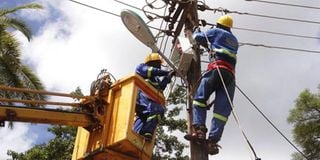Kenya Power ends tokens purchase from third-party vendors

Kenya Power staff at work in Nyeri. The company has ditched agents who have been facilitating the purchase of electricity by both their prepaid and postpaid customers in the company's latest cost-cutting measures.
What you need to know:
- The company said it will not be renewing the contracts of the nine companies the utility firm had contracted to process electricity purchases on its behalf.
- Their contracts expire on August 31.
- The firm is now fully moving the buying of electricity by its customers in-house and says it has built enough capacity to handle the payments.
Kenya Power has ditched agents who have been facilitating the purchase of electricity by both their prepaid and postpaid customers in the company's latest cost-cutting measures.
The company on Tuesday said it will not be renewing the contracts of the nine companies the utility firm had contracted to process electricity purchases on its behalf. Their contracts expire tomorrow, August 31.
The firm is now fully moving the buying of electricity by its customers in-house and says it has built enough capacity to handle the payments.
“We wish to inform our prepaid and postpaid customers that effective Thursday, September 1, 2022, the purchase of prepaid tokens and payment of postpaid bills will only be made through (internal channels),” said the company.
“Please note that no other third-party agent is authorised to offer these services on behalf of KPLC. The company will therefore not take liability for any transaction conducted through any other platform.”
The agents have been earning a commission on power purchases that they have been processing.
“Banks will continue to offer payment platforms for postpaid services,” said Kenya Power.
Cost-cutting measures
The move is part of the company’s cost-cutting measures at a time its revenues are set to be heavily hit by a 15 per cent cut in power prices in January.
The firm is in a dire financial situation and owes billions of shillings to electricity producers.
It also incurs billions of shillings to service its mountain of debt amid rising operational expenses such as salaries for workers, adding to its financial woes.
Kenya Power is also eyeing growing its revenues through connecting more consumers to the national power grid, accelerating debt collection from defaulters and a fresh bid for an electricity tariffs review.
The company has revived its bid for a review of electricity prices months after power charges were slashed by 15 per cent, dealing a heavy blow to its finances.
The utility firm will submit a new tariff application to the Energy and Petroleum Regulatory Authority (Epra) between October and December, even as the firm sought to climb out of a financial hole created by the power price cut in January.
Epra has already made provision for Kenya Power’s new application. It has set aside funds for a conference to discuss the tariff review request.
Official documents seen by the Nation show that Epra has budgeted Sh495,000 for the meeting which will form part of stakeholder engagement on the matter.
The Energy Act 2019 provides that power tariffs be reviewed every three years although this hasn’t been respected due to the fact that Epra has often delayed or amended the rates to ease inflation pressure on households.
The last comprehensive review of electricity prices was in 2019.





